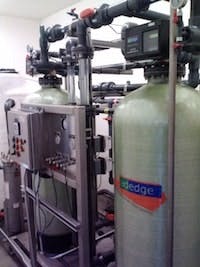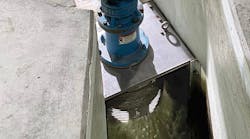The town of Newport Center, Vt., is a small community of approximately 1,500 residents located just south of the U.S.-Canada border. A combination of drought and an increase of water use required the drilling of a new well for the community in addition to two wells already in service.
Water quality testing of the new well found arsenic levels at 20 parts per billion (ppb)—well above the 10 ppb drinking water standard set by the U.S. Environmental Protection Agency (EPA) and the state of Vermont.
Due to the elevated level of arsenic in the water, the town was forced to purchase water from a neighboring community and haul it to a storage tank where it went to distribution. This temporary solution became costly and inadequate for the community and a more cost-effective and permanent solution was needed.
Seeking a Solution
In May 2012, AdEdge Water Technologies LLC was contacted by the engineering firm Aldrich and Elliot to design, manufacture and start up an arsenic removal system for the community.
The treatment system fully integrates with the existing equipment on-site including a hydropneumatic tank, gravity feed to a concrete storage reservoir and a gravity feed distribution system. AdEdge designed a system that delivers water at approximately 18 gal per minute (gpm) for 350 of the town’s residents.
AdEdge provided a skid-mounted adsorption packaged unit rated for a maximum design flow of 20 gpm. AdEdge Packaged Unit (APU) systems are designed as turnkey treatment solutions for a variety of contaminants. System features include differential pressure switches, local control panel and gauges, flow sensors and totalizers, and a central hydraulic panel with sample ports for chlorine monitoring. A relay control panel is included in the system that controls the well pump, treatment system, backwash supply pump and backwash/recycle system.
Prior to entering the system, water is pumped from the well and is injected with chlorine (sodium hypochlorite) via the AdEdge ADIN chemical feed system to oxidize any arsenic (III) to arsenic (V) for optimal removal.
After being treated by the chemical feed system, the water moves into the adsorption treatment system utilizing the AdEdge E33 granular ferric oxide media. The media has a high capacity for arsenic and is delivered in a dry, non-crystalline form. It is robust and easy to handle, is stored and shipped dry, and has received NSF approval for use in drinking water systems under Standard 61.
The adsorption system consists of two 24-in. diameter by 65-in. tall composite tanks in a lead/lag configuration. The lead/lag configuration moves the water through the first vessel and then through the second vessel for optimal removal of the arsenic. The configuration is also reversible, so if the first vessel nears breakthrough of the media, the vessels can be switched for maximum capacity of the E33 media.
The arsenic removal system requires backwashing to remove any accumulated suspended solids in the treatment vessels. An H2Zero backwash/recycle system is integrated with the control panel, which conserves water by storing and treating the contaminated backwash water from the adsorption system. The source of the backwash water is from a storage reservoir that uses a backwash supply pump to provide a 28-gpm flow needed for the backwash cycle. Backwashing of the treatment system occurs only once a month due to the low level of suspended solids in the water.
Treatment Results
AdEdge expedited the manufacturing and start-up of the treatment system to meet the aggressive timeline the town of Newport Center had to comply with the EPA and state of Vermont standards. The treatment system began full operation in April 2013. Since start-up, arsenic levels are below detection levels.
Richard J. Cavagnaro is marketing coordinator for AdEdge Water Technologies LLC. Cavagnaro can be reached at [email protected] or 678.835.0052.


